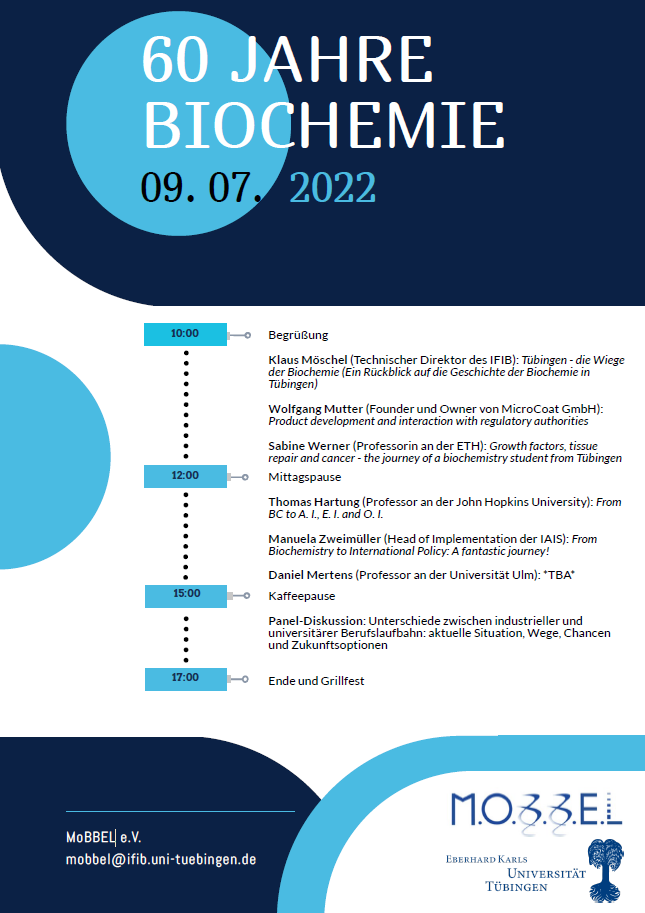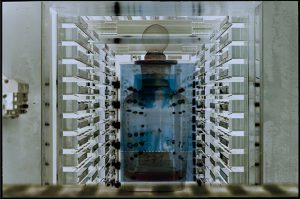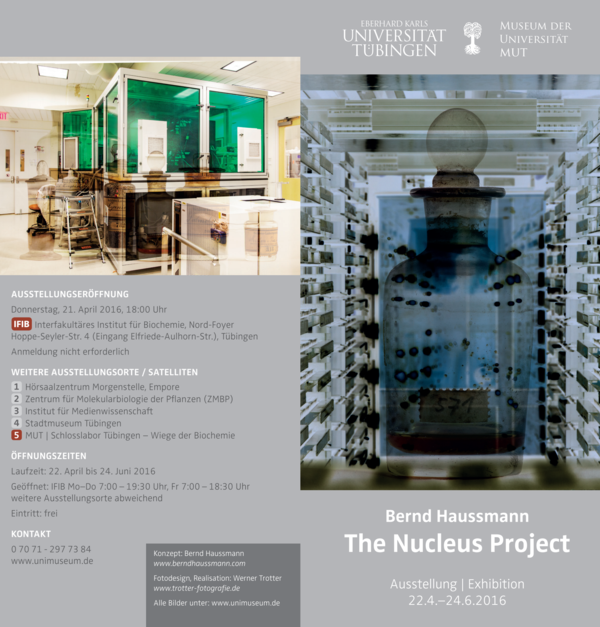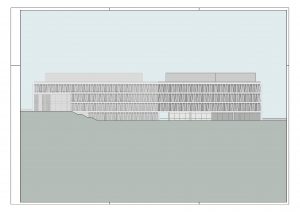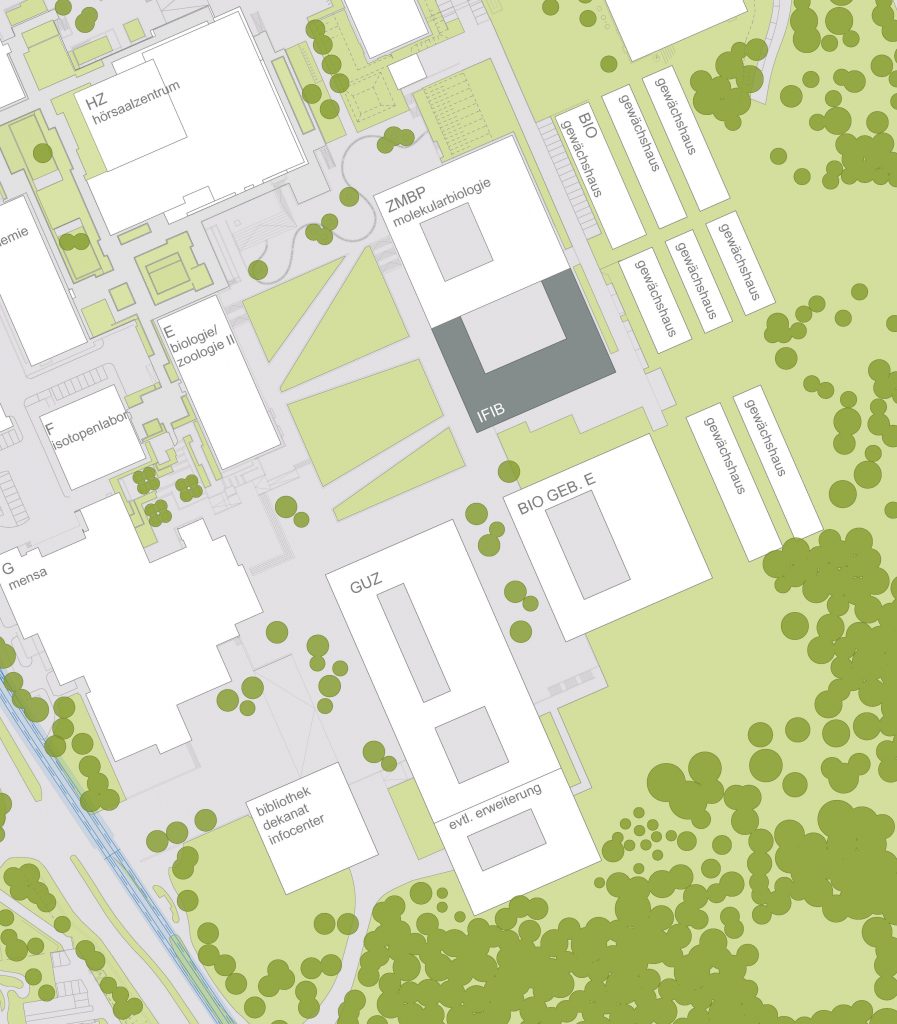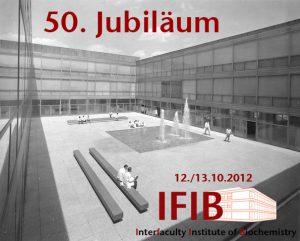For the first time since 2012 MoBBEL awarded a prize for excellent achievements or dissertations from Tübingen’s biochemistry students and alumni. This year’s prize was the first to be awarded for a master’s thesis.
From all the received master’s theses, Sophie Kieferle’s thesis was selected by a committee of former MoBBEL board members. She presented her results to the audience and received her prize, which was made possible by donations from Microcoat Biotechnologie GmbH, Bernried and AnsoThera, Erlangen.
The award ceremony was held on July 12 at the new IFIB building, followed by a small socializing event.
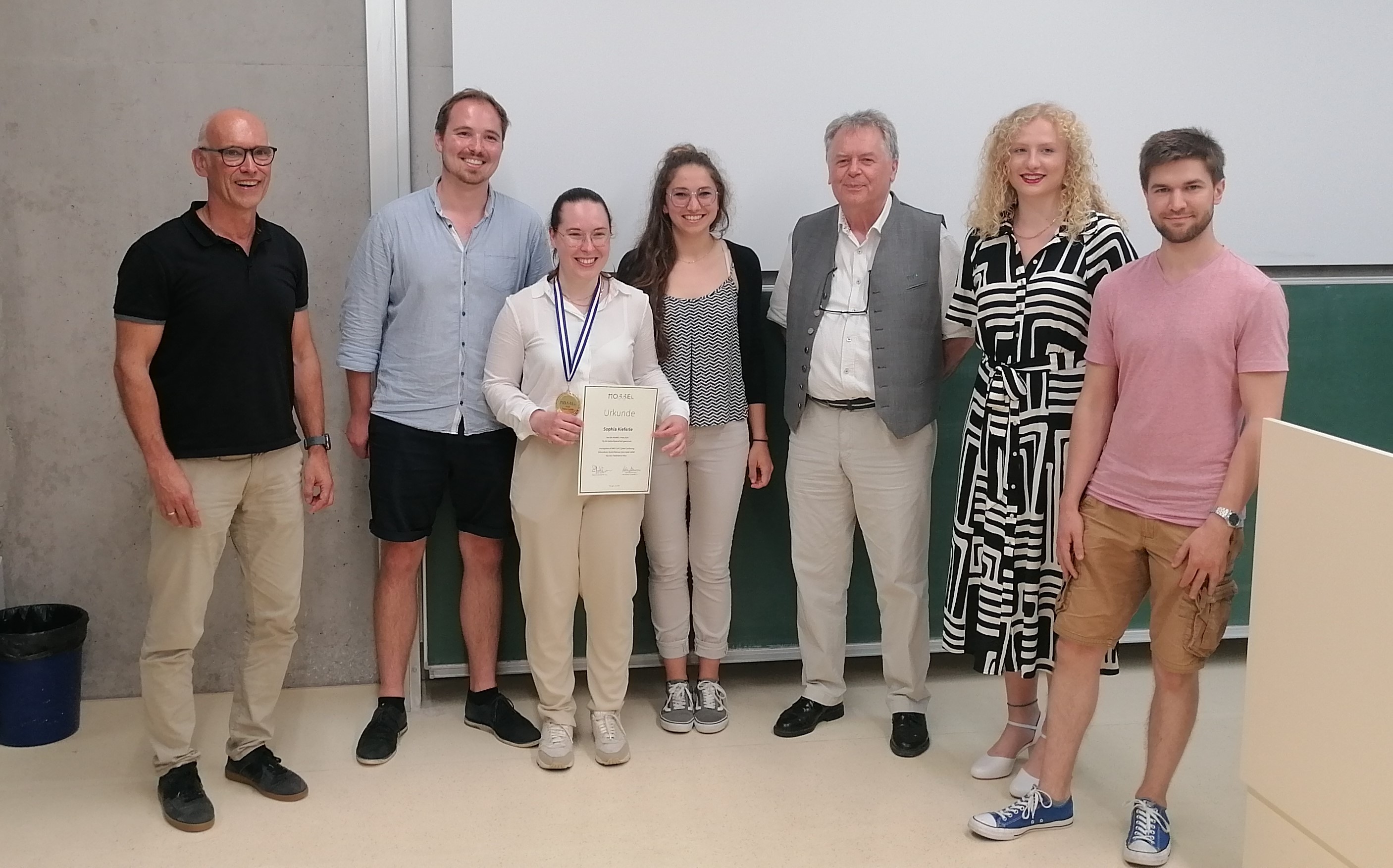
Dear (former) biochemistry students,
we are delighted to inform you that the alumni association MoBBEL e.V. will award the MoBBEL Prize for an excellent master’s thesis in 2024. The prize money will be €2.000 and is sponsored by Microcoat Biotechnologie GmbH, Bernried and AnsoThera, Erlangen.
To participate, you have to fulfill the following requirements:
1) Master thesis should be submitted between 01.01.2023 and 31.12.2023
2) You should have been enrolled in the biochemistry master program at the University of Tübingen during the master thesis
To participate, please send the following documents to mobbel@ifib.uni-tuebingen.de:
1) Master thesis as PDF
2) Curriculum vitae
The deadline is on 29.02.2024. The award ceremony will take place in person at the end of june 2024. We are looking forward to your applications,
Best regards,
Your MoBBEL-Team
(Joséphine, Sonja, Sophia, Lars, Maxi and Steffen)
Dear MoBBEL members and friends of Biochemistry Tübingen,
This year’s alumni meeting will follow the IFIB Career Forum on Oct 13, 2023. After listening to exciting stories of former students of Biochemistry in Tübingen (9am-3pm GUZ, LectureHall 3M07) we will meet in the lecture hall of the new IFIB at 17 p.m. for our annual meeting.
Afterwards we will have a barbecue. We will food and drink, but also feel free to also bring your own food.
For those who are not able to join in person we will provide a ZOOM-Link via e-mail.
We are very much looking forward to seeing you again!
We are happy to announce, that our website is going to recieve some updates over the coming weeks. While our new team tests out the oppertunities WordPress (our content management system) presents we might delete this post later.
With this update we also want to thank the participants of our 60-Year-Anniversary celebration of Biochemistry in Tübingen.
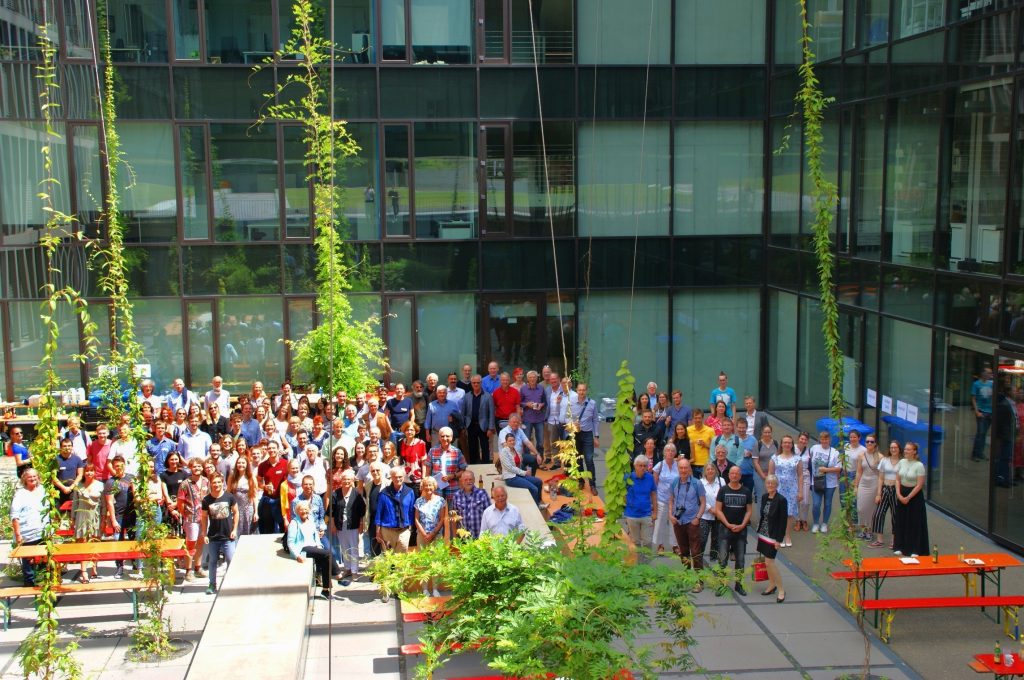
SAVE THE DATE:
Am 09.07.2022 findet auf der Morgenstelle in Tübingen ein Fest zur Feier des 60-jährigen Bestehen des IFIB statt.
Freut Euch auf Vorträge von ehemaligen Biochemie Absolvent*innen, Hintergründe zu 60 Jahren IFIB und Kennenlernen alter Kommiliton*innen.
Wir freuen uns, euch zahlreich begrüßen zu können.
An art exhibition by Bernd Haussmann, April 22 to June 24, 2016
From April 22 to June 24, 2016 you have the chance to attend an exceptional exhibition in the northern foyer of the Interfaculty Institute of Biochemistry (IFIB). The concept of The Nucleus Project is to create visual and cognitive connection between biochemistry in the old times and nowadays. The photographs bring together the roots of biochemistry, at the laboratory at the Schloss Höhentübingen, and contemporary research at twenty-first-century locations, such as the modern facilities at the Schnarrenberg.
The works from The Nucelus Project orbit, like satellites, around the city of Tübingen. Photographic images are exhibited at five other locations, in addition to the IFIB. (see list of all locations below)
Creator of The Nucleus Project is the artist Bernd Haussmann. Born in Tübingen, Haussmann has been a US resident since 1994, where he worked as an artist-in-residence at the Broad Institute of Harvard and MIT.
Opening: Thursday, 21.4.2016, 6 pm, IFIB
Duration: 22.4. – 24.6.2016 at five different locations (see all locations below)
Opening times at the IFIB: Mon – Th 7:00am – 7:30pm, Fri 7:00 – 6:30pm
Opening times at other locations may vary
Free admission
Exhibition locations
- Interfaculty Institute of Biochemistry (IFIB), Northern foyer
- Hörsaalzentrum Morgenstelle, Gallery
- Center for Plant Molecular Biology (ZMBP)
- Institute of Media Studies
- Tübingen City Museum
- University of Tübingen Museum (MUT | Schlosslabor Tübingen – Wiege der Biochemie)
Contact
University of Tübingen Museum
Tel.: +49 7071 2977384
http://www.unimuseum.uni-tuebingen.de
IFIB is to move to a new state-of-the-art-building by 2019. The construction will be a part of the renewed Campus Morgenstelle under the concept of a Campus of the Future.
As a part of the Excellence Initiative of the German Higher Education and Research, Eberhard Karls University strives to consolidate and expand its importance as a research institution. The building concept Campus of the Future is a joint venture of the Ministry for Science, Research and the Arts and the Ministry of Finance and Economics of Baden-Württemberg, and the University of Tübingen. Campus of the Future involves construction works throughout the city.
Fundamental objectives of the reconstructions are more efficient use of the surface resources, improved energy efficiency, and a reduction in management and renovation costs by spatial concentration. As a result, not only will teaching and research quality be enhanced, but also traffic load due to commuting between the facilities will be significantly lowered.
The expansion of Campus Morgenstelle is a major milestone in the development of the University of Tübingen. The campus was built in two phases between 1968 and 1974 on a total surface of 70 000 m2. Fifty years later, it is to be reconstructed to become a “campus of the future”. According to the building plan Campus Morgenstelle Part I from 2009, the cafeteria has been renovated and the southern part of the Morgenstelle has already been expanded. Today there is the newly-built Center for Molecular Plant Biology (ZMBP). Asa part of Campus Morgenstelle Part II, in early 2016 started the constructions of the new Interfaculty Institute of Biochemistry (IFIB) and the Geosciences and Environmental Research Center (GUZ). A building for the Department of Computer Sciences and a Central Life Sciences Library will follow. Additional information on the construction work can be found at the end of this article (German only).
The new IFIB building is going to be situated in the immediate proximity of ZMBP, creating better conditions for scientific collaboration between the two and for optimal use of technical resources, such as lecture halls and libraries. Constructions began in January 2016 and are planned to finish in January 2019. With an estimated total cost of 41,2 million euro and a useful area of only 5 320 m2 , IFIB is planned to have a gross building area of 9
296 m2. Nevertheless, the new building will be highly energy efficient due to the concrete core activation climate system, keeping a moderate temperature with little fluctuation throughout the seasons.
Let the Campus of the Future just like an old tree keep its roots strong in the ground, but spread its ideas like branches and yield success like mellow fruits.
In October 2012 the oldest Biochemistry degree in Germany celebrated its 50th anniversary with a highly successful symposium at the Interfaculty Institute of Biochemistry.
In 1962 Eberhard-Karls Universität Tübingen became the first university in Germany to offer a degree in Biochemistry. Moreover, its newly-built institute brought about another novelty – it was the first university institute in Germany to host independent research groups. The Biochemistry course was established by Professor Günther Weitzel and began as a program with seven students only. Since then, more than 1700 biochemists have gained their Diploma from the University of Tübingen. Among them are the Nobel laureate Hartmut Michel (Nobel Prize in 1988) and Christiane Nüsslein-Volhard (Nobel Prize in 1995).
Since the winter semester 2009/2010 the University of Tübingen offers a Bachelor of Science in Biochemistry instead of a Diploma program. Furthermore, in the winter semester 2012/2013 the university introduced a new and broad Master of Science program, taught exclusively in English. The master course is organized by the Interfaculty Institute of Biochemistry (IFIB) and is highly modular and adaptable to the students’ personal preferences. Every year hundreds of applicants go through a competitive admission process, of which 90 bachelor and 35 master students are admitted to the Biochemistry course.
The celebrations for the 50th anniversary of the Biochemistry degree began with a champagne reception held at the Museum Restaurant on Friday, October the 12th. The guests were warmly welcomed by the Director of the IFIB, Prof. Thilo Stehle. The evening continued with speeches by Boris Palmer, mayor of Tübingen, and Prof. Leopold Flohé, one of the first Biochemistry graduates from the University of Tübingen.
On the second day, October the 13th, alumni of the University of Tübingen gave insightful talks on a wide range of current research topics in the symposium at the IFIB. The event was opened by Dr. Herbert Müther, Vice-Rector of the University of Tübingen. At the end of this article is a brief list of the speakers and their topics.
The symposium was complemented by an Alumni Meeting and amusing stories of the good old days. More than 300 alumni and current students participated in the celebrations.
It is clear that the Biochemistry at the University of Tübingen enters its second 50 years with the same well-deserved confidence, exploratory spirit and unabated enthusiasm that it has approached its 50 first years.
Symposium Speakers
Albrecht Wendel, University Hospital Tübingen – “Chronicle of a Death Foretold – from Marquez to apoptosis”
Dietmar Vestweber, Max Planck Institute Münster – “Molecular mechanisms of leukocyte invasion into tissue”
Hans-Dieter Klenk, University of Marburg – “Influenza viruses on the way from animals to human”
Hans-Martin Jäck, University of Erlangen – “How miRNA controls B cells”
Jürgen Behrens, University of Erlangen – “Wnt signaling and colorectal cancer”
Jürgen Bernhagen, University of Aachen –“50 years of Biochemistry Studies: Tübingen meets 50 years of chemokines: the impact of parts 1-4 on inflammation research“
Kai-Uwe Fröhlich, University of Graz – “Yeasts as a model organism for aging, obesity and cancer”
Martin Eilers, University of Würzburg – “Thinking about novel tumor therapies”
Stefan Sigrist, Free University of Berlin – “Shedding light on synapse assembly”
Tina Romies, Free University of Berlin – “Plants in stress”
Ulrike Gaul, Ludwig Maximilians University of Munich – “Functional genomic approaches to studying the role of glia in the nervous system”
Organisation
Interfaculty Institute of Biochemistry (IFIB)
Prof. Doron Rapaport
Dr. Klaus Möschel
Hoppe-Seyler-Str. 4
72076 Tübingen
Tel.: +49 7071 29-73340
